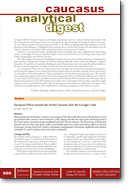Oil and Political Stability in Azerbaijan: The Role of Policy Learning

Author(s): Farid Guliyev
Editor(s): Jeronim Perovic, Lili Di Puppo, Iris Kempe, Heiko Pleines, Matthias Neumann, Robert Orttung
Series: Caucasus Analytical Digest (CAD)
Issue: 47
Pages: 9-11
Publisher(s): Center for Security Studies (CSS), ETH Zurich; Research Centre for East European Studies, University of Bremen; Institute for European, Russian and Eurasian Studies, George Washington University
Publication Year: 2013
